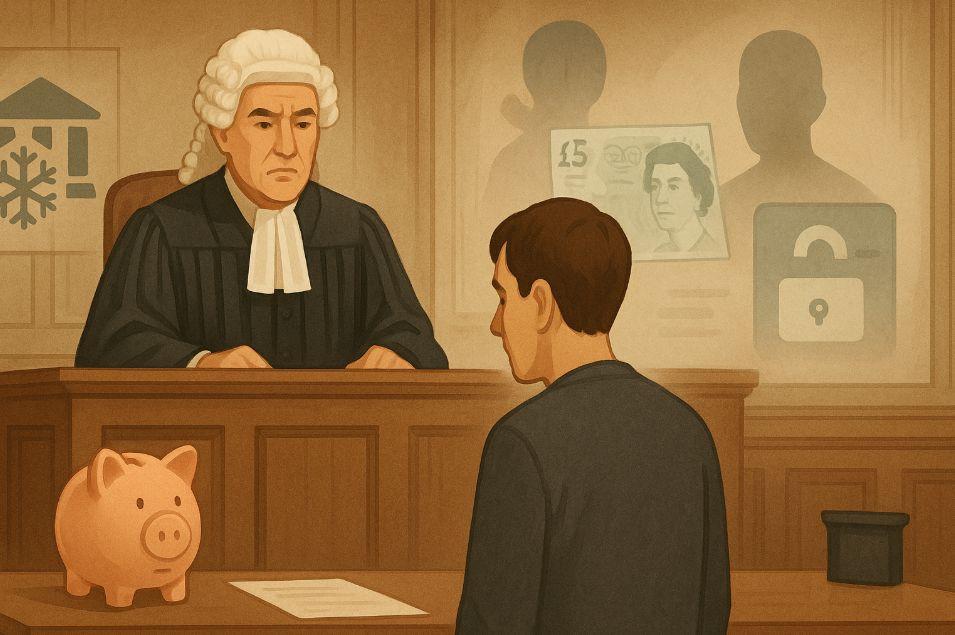When someone passes away in the UK, their financial affairs become subject to legal oversight. Among these, bank accounts are of particular concern. Many people are unaware that withdrawing money from a deceased person’s account without legal permission is a criminal offence.
Whether done intentionally or out of confusion, unauthorised access to a dead person’s funds can lead to serious consequences, including prosecution, fines, and imprisonment.
This article explores the laws governing deceased accounts in the UK, the role of probate, and what the penalties are for unlawfully taking money after someone has died.
Is It Illegal to Withdraw Money from a Deceased Person’s Account in the UK?

Yes, it is illegal to withdraw money from a deceased person’s bank account unless you have the legal authority to do so. When a bank is notified of a customer’s death, it typically freezes all individual accounts in that person’s name to prevent any further activity. This is a protective measure to ensure the deceased’s estate is administered properly.
Only someone who has been granted probate, or is officially acting as an administrator of the estate, is permitted to access the funds. If the account was jointly held, the surviving account holder may access the funds under certain conditions, but even then, caution must be taken to avoid legal complications. Without proper legal status, any withdrawal even by a close family member can be treated as theft or fraud.
What Are the Legal Consequences of Taking Money Without Authorisation?
In the UK, taking money from a deceased person’s account without authorisation can result in both criminal and civil consequences. The law takes these offences seriously, as they involve the misappropriation of estate assets. A person found guilty of unauthorised withdrawals may face charges under the Theft Act 1968 or the Fraud Act 2006, both of which carry severe penalties.
Criminally, a conviction for theft or fraud can lead to a prison sentence of up to ten years, depending on the amount taken and the circumstances involved. Financial penalties may also be imposed, including unlimited fines. In addition, the court may order the individual to repay the stolen funds to the estate or its rightful beneficiaries.
On the civil side, other heirs or executors may pursue legal action to recover the money, often involving court proceedings that can add legal costs to the offender’s burden.
How Do UK Laws Protect Deceased Bank Accounts?
Deceased individuals’ bank accounts in the UK are protected by a combination of statutory and procedural safeguards. Once the bank is notified of the account holder’s death, the account is frozen, and all direct debits and standing orders are stopped.
The bank will not allow anyone to access or transfer the funds until the proper legal documents, such as a death certificate and a grant of probate or letters of administration, are submitted.
The Administration of Estates Act 1925 plays a central role in this process. It mandates that the deceased’s assets be distributed according to the law or the will. This legal framework helps to ensure that the deceased’s wishes are respected and prevents unauthorised individuals from taking control of the estate.
What Role Does Probate Play in Accessing a Deceased Person’s Funds?

Probate is the legal process that confirms the validity of a will and grants the executor the authority to manage the deceased’s estate. Without probate, banks and financial institutions will not release funds to anyone, regardless of their relationship to the deceased.
During probate, the executor is given a grant of probate, which acts as proof that they are legally authorised to handle the deceased person’s assets, including bank accounts.
This authorisation allows them to pay debts, settle bills, and distribute any remaining funds to the beneficiaries named in the will. In cases where no will exists, a similar legal document known as “letters of administration” is issued to the appropriate person, often a next of kin.
Can You Go to Jail for Taking Money from a Dead Relative’s Account?
Yes, taking money from a deceased relative’s account without permission can lead to imprisonment. Under the Fraud Act 2006, anyone who dishonestly makes a gain for themselves or causes a loss to another by abusing their position can be charged with fraud. Similarly, under the Theft Act 1968, unlawfully taking property belonging to another with the intent to permanently deprive them of it constitutes theft.
There have been real-world examples in the UK where individuals have been jailed for taking money from a deceased relative’s account. Courts consider the amount stolen, the offender’s intent, and the impact on the estate and beneficiaries. The presence of deceit, premeditation, or a breach of trust often results in harsher sentences.
What Happens If Someone Misuses Power of Attorney After Death?
Power of Attorney (POA) is a legal authority that allows a person to act on someone else’s behalf during their lifetime. However, POA becomes invalid the moment the person who granted it dies. Continuing to use POA after someone has passed away is unlawful and may be prosecuted as fraud.
If someone uses a deceased individual’s bank card or continues managing their finances using previously granted POA documents, they could face criminal charges. The courts view such misuse as a serious offence, especially if it results in financial loss to the estate or its rightful heirs.
How Can Executors and Family Members Avoid Legal Trouble?

To avoid unintentional legal violations, it is crucial for executors and family members to fully understand their roles and responsibilities. The safest course of action is to avoid touching any financial accounts until probate has been granted.
During the probate process, the executor must keep detailed records of all financial transactions, including payments made from the estate, and ensure full transparency with the beneficiaries.
Seeking legal advice from a solicitor or probate specialist can also help prevent missteps. Additionally, maintaining open communication among family members helps manage expectations and reduces the likelihood of disputes or accusations of wrongdoing.
How Do Banks and Authorities Investigate Suspicious Withdrawals After Death?
When banks detect suspicious transactions on a deceased person’s account such as card usage after the date of death they are obligated to investigate.
Most banks have compliance teams that review account activity and may freeze the account if fraud is suspected. They may also report the incident to the police or to Action Fraud, the UK’s national fraud reporting centre.
Law enforcement agencies may then investigate further, tracing where the money went and who accessed it. Investigations can include reviewing CCTV footage, bank login records, and transaction histories. If evidence suggests wrongdoing, the matter can escalate to criminal prosecution.
What Are the Rights of Other Heirs If Someone Steals from the Estate?
Beneficiaries who believe someone has stolen from the estate have the right to take legal action. They can challenge the administration of the estate in probate court, request a formal accounting of assets, and pursue civil recovery of any stolen funds. In more serious cases, they may report the matter to the police for criminal investigation.
If the person who took the money is also acting as an executor or administrator, the court can remove them from that role and appoint someone else. In some situations, the court may even freeze the estate’s assets to prevent further losses while an investigation is ongoing.
How Can You Report Theft or Financial Abuse of a Deceased’s Estate?

If you suspect that someone has taken money unlawfully from a deceased person’s estate, you should report the matter immediately. Start by gathering any available evidence, such as bank statements, communication records, and documentation of the deceased’s wishes. Reports can be made to Action Fraud, which is responsible for handling cases of financial fraud in the UK.
You should also contact the solicitor managing the estate, or if one has not been appointed, consider seeking legal advice to initiate civil proceedings. If criminal behaviour is evident, you can contact your local police force directly. The sooner these issues are reported, the better the chances of recovering the funds and ensuring justice is served.
Comparison of Legal vs Illegal Access to a Deceased Person’s Account
| Action | Legal? | Requires Probate? | Potential Legal Outcome |
| Executor accesses account after receiving probate | Yes | Yes | No penalty |
| Family member accesses account without authority | No | No | Prison sentence, fine, civil claim |
| Using POA after the person’s death | No | No | Fraud charges |
| Joint account holder accessing joint funds | Usually Yes | No | No penalty (if legitimate) |
Conclusion
Handling a deceased person’s financial affairs comes with serious legal responsibility. While the temptation or confusion around accessing funds may exist especially during a time of grief it is vital to follow the correct legal process. Taking money without proper authorisation is not only unethical but also a criminal act under UK law.
Understanding probate, executor responsibilities, and your legal limitations helps ensure that the estate is administered fairly and lawfully. If ever in doubt, it’s always best to consult with a qualified legal professional to avoid unintended legal consequences.
FAQs
Can a spouse access a deceased partner’s bank account in the UK?
A spouse cannot access the individual account of their partner unless it is a joint account. Probate is generally required to release funds from sole accounts.
What if the amount withdrawn was very small?
Even small amounts taken without legal authority can be classified as theft or fraud. The value may influence sentencing but does not make the act legal.
Do banks inform the police about unauthorised account use after death?
Yes, banks have a duty to report suspicious transactions involving deceased accounts to the authorities for potential fraud investigation.
How long does it take to get probate in the UK?
Probate typically takes between eight to twelve weeks to be granted, though complex estates may take longer.
Can the court recover funds stolen from a deceased’s estate?
Yes, the court can issue orders for repayment and impose penalties, including freezing assets and seizing property if necessary.
Are any exceptions made by banks for small estates?
Some banks may release funds from small estates without probate if the total value falls under a certain threshold, usually between £5,000 and £50,000.
What counts as inheritance theft?
Inheritance theft involves unlawfully taking or hiding assets from an estate, including money, valuables, or even property, without legal right or consent









Leave feedback about this